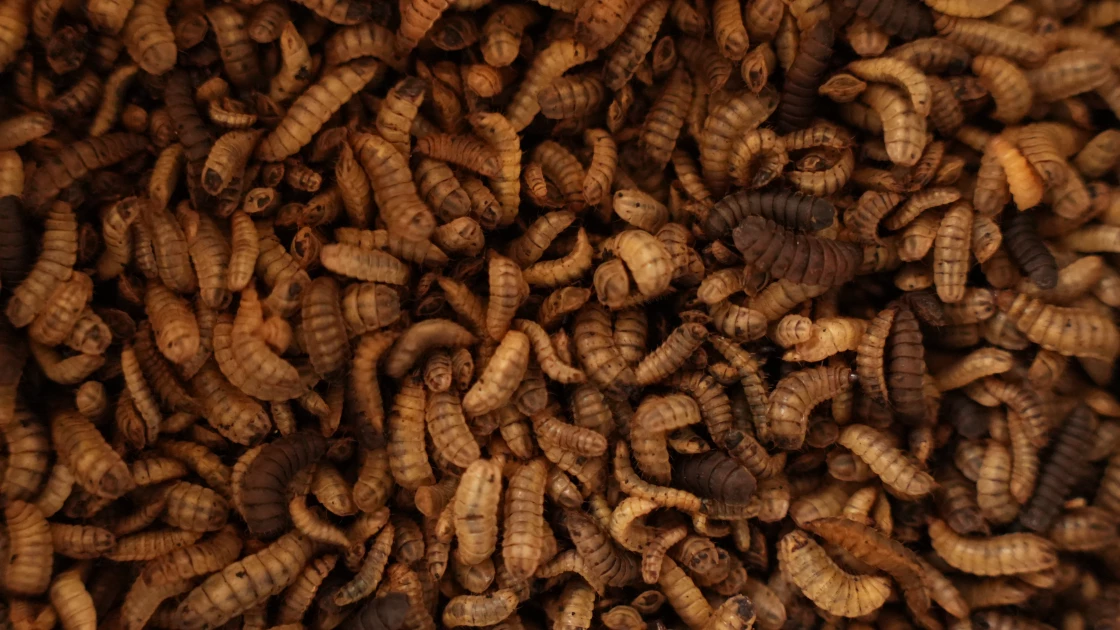Black soldier fly transforming farming in Kenya


Audio By Vocalize
About 40 kilometres from Nairobi’s bustling Central Business District lies Witethie village. In this tranquil setting rests a modest 40 ft. by 80 ft. piece of land, roughly 460 square meters in size.
Here, amidst the rustic charm, Francis Muiruri, well known as Francis wa Kuku, tends to his 4000 chickens in cages, embodying resilience and dedication despite physical challenges.
Muiruri's journey transcends poultry farming; it is a testament to the human spirit's capacity to triumph over adversity. When he tragically lost his mother to cancer, she left him with a legacy: a brood of 50 chickens. Through perseverance and love, this humble inheritance has flourished into a thriving enterprise.
In the face of hardship, Muiruri remained unwavering. He ingeniously turned his challenges into opportunities, initially relying on Omena to nourish his flock, a poignant gesture honoring his mother's memory.
Muiruri's farm has become a symbol of hope, attracting visitors from diverse corners of the globe, from Uganda to the USA, including dignitaries from the Australian Embassy and guests from the Pacific.
Supported by a research project conducted by the International Centre of Insect Physiology and Ecology (ICIPE) and funding from the Australian Centre for International Agricultural Research (ACIAR) Muiruri shares his knowledge generously, offering training to aspiring farmers, thereby enriching lives while expanding his own avenues of revenue.
"I now use black soldier fly due to the unavailability or expensive protein sources and high cost of animal feed. As an accountant by profession, I leverage loans from my employer to finance my venture,” he says.
Across Kiambu County, Naomi Waithera Kamau, also an accountant, manages Precious Piggery Farm. Through perseverance and research, she discovered the potential of black soldier fly in animal feed formulation, significantly improving the quality and efficiency of her pig farming operation.
"Since incorporating black soldier fly into my feeds, my pigs reach the desired weight in significantly less time," Waithera explains. "Moreover, the quality of our animals has surged, resulting in higher returns on investment."
Waithera emphasizes the importance of sound business practices, highlighting the need for market research and cost analysis to mitigate risks in agribusiness ventures. Her success underscores the transformative impact of innovative approaches in traditional industries.
Winnie is a 23 year old energy engineer in Kiambu.
She sells wet larvae to farmers and projecting to use black Soldier Fly for energy.
"I encourage youth who may not want to touch the dirt to join any stage of the value chain, I will meddle in the dirt but they can work with the clean end products," she cites.
But what exactly sets black soldier fly apart?
From research conducted at the ICIPE center, black soldier fly farming has emerged as a sustainable solution for food, feed, fertilizer, and environmental conservation.
Winnie, a former energy engineer turned black soldier fly farmer, recounts her journey of trial and error, emphasizing the critical role of proper substrate management in mitigating challenges such as forensic mite infestations.
Chrysuntus Tanga, a researcher at ICIPE, sheds light on the unique challenges facing black soldier fly farming, particularly the threat of forensic mites and parasites. He underscores the importance of meticulous substrate management and parasite control measures to ensure the success of black soldier fly colonies.
Despite these challenges, black soldier fly farming offers numerous benefits, including reduced turnaround time and enhanced sustainability. Tanga explains how controlled environmental conditions can enable multiple harvests per year, significantly outpacing conventional protein sources in terms of efficiency and ecological footprint.
Moreover, black soldier flies play a crucial role in ensuring food security, offering a sustainable protein source that can alleviate hunger and malnutrition in resource-constrained regions.
Tanga projects the potential for black soldier fly farming to replace a significant portion of conventional protein sources, thereby reducing import dependency and promoting local self-sufficiency.
In addition to its protein-rich larvae, black soldier flies produce frass fertilizer, a nutrient-rich byproduct that enhances soil fertility and promotes plant growth. Tanga highlights the environmental benefits of frass fertilizer, including reduced nutrient leaching and improved soil structure, underscoring its potential to revolutionize agricultural practices.
As Kenya emerges as a benchmark in the burgeoning black soldier fly value chain, the economic implications are profound. From reduced production costs to increased foreign exchange savings, the adoption of black soldier fly farming promises to stimulate economic growth and enhance livelihoods across the country.
The black soldier fly represents more than just a humble insect; it symbolizes a paradigm shift in agriculture, where innovation and sustainability converge to address pressing global challenges.


Leave a Comment